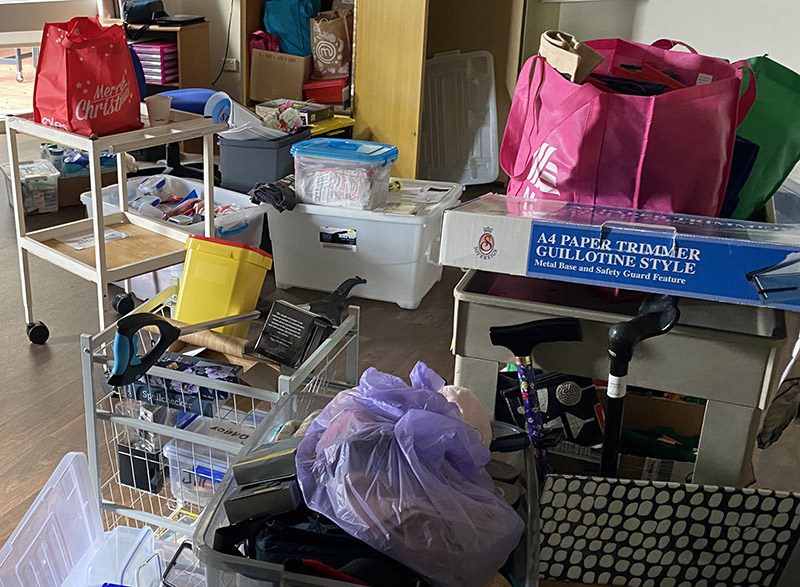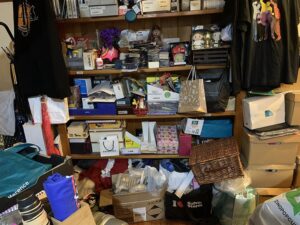
Clients tell me their house didn’t always look like this. Before kids, before Covid, before a diagnosis or trauma – there are lots of life events that can exacerbate the existence and impact of clutter.
But clutter creep doesn’t happen overnight. It’s usually an accumulation over time.
Staying tidy is important, but so is the volume of stuff, therefore preventing it from entering the home is crucial.
1. Where does the clutter come from? Shopping for leisure
Strolling around Westfield with your credit card seems like a harmless way to spend an afternoon. But before you know it, you have bags full of stuff you didn’t know you needed.
Likewise, if you subscribe to Catch.com or have a Temu account, or – heck all you need is a social media account to be bombarded by ads – then you are vulnerable.
Solution
Stay out of the shops and off the websites. Avoiding temptation is much better than relying on willpower. Find hobbies that support you rather than undermine you.
2. Where does the clutter come from? Just-in-case shopping
Hands-up if you stocked up on tinned food during the pandemic, or buy 10 boxes of cereal when it’s on special.
Other culprits include hobbies you may like to try one day, or hair dye you may feel like using next summer, or an additional desk in case your current one breaks.
Once these items are in your house they are mentally and logistically difficult to remove.
Solution
Here’s the thing – everything is available all the time. You don’t need to stockpile.
Buy The Thing, only when you need The Thing and not before. Even if it’s on sale – which you probably won’t know about if you adhere to the above and steer clear of the shops.
The money you ‘save’ by buying early is not worth your physical and mental space. Keep your money and your space, and the shops can keep The Things for you, until you are ready.
Oh, and if you bought too much toilet paper during 2020, I don’t have a huge problem with it. Toilet paper is not an IF prospect but a WHEN. You will get through that, and god only knows how my family goes through as many rolls as it does.
3. Where does the clutter come from? Gifts
The love language of some families is gifts. Stuff. Love in the shape of a gift bag.
Even gift vouchers can create clutter. They sit around in the fruit bowl, or worse still go into hiding and emerge only after expiry. Unless there is an immediate need for that card, it places a mental burden on the recipient to find a way to spend it and avoid wasting it.
Then there are hand-me-downs from friends and family. Toys they have outgrown, appliances they have upgraded, clothes from last season. The giver is probably well-meaning, but may also be reducing their own decluttering guilt by dumping on you.
You don’t want to be the resident grinch or an ungrateful sod, right?
Solution
Maybe you could suggest a Kris Kringle or Bad Santa at Christmas. Or special food / wine contributions – asking people to spend on high quality special-occasion consumables rather than on stuff. Or even a shared experience.
When you have a birthday, stipulate No Gifts on the invitation and explain you are decluttering and this is important to you. Have dinner at a restaurant and have guests chip in for your meal, as the present.
If you don’t want the hand-me-downs, give a similar explanation. Soften by recommending a local op shop which may take them. Explain it once, and the kindly giver will hopefully re-route future efforts.
It’s awkward, but once you break the habit, these occasions become much less burdensome on both the giver and recipient.
4. Where does the clutter come from? Other people’s stuff
Do you have 20-year-old text books your now-adult kids have left you with? Their old art projects, keepsakes and one of those white signed teddy bears from end-of-school?
What about things you don’t want, that you inherited with the holiday house from your now-deceased parents?
Or maybe you have a partner who leaves their stuff everywhere, and it bothers you more than it bothers them.
Solution
If the owner of the clutter lives elsewhere, send them photos of their stuff and give them a deadline. Or invite them for dinner and a decluttering session. If you are feeling benevolent or they don’t have the capacity to take their keepsakes, assign them a tub or drawer that you can hold for them – but set limits and keep it contained and labelled.
If the owner of the clutter has died, you don’t need to keep their stuff to honour their memory. Only keep what is meaningful for you. I’m sure they would want you to be happy and not burdened.
If the owner of the clutter lives with you, it’s more difficult. Read this article about decluttering other people’s stuff, and remember – compromises will be necessary. You can assign them a space for their stuff and request that shared spaces be maintained to a certain standard.
The best thing you can do is lead by example, and tackle all of your own clutter first. Have you done that yet?
5. Where does the clutter come from? Failure to declutter
Acquiring is inevitable because due to changing habits, situations and sizes, we need to buy things. But often we don’t remove the worn-out stuff we are replacing. If we keep adding and don’t subtract, it will eventually become a problem. Space is a finite resource.
Solution
If you are cluttered, you need to remove items that don’t serve you.
When you are at a comfortable volume of belongings, practice a one-in-one-out policy to avoid accumulation. When you are considering purchasing something, ask yourself two questions: 1. Where will this live? 2. What can I get rid of to accomodate this?
Where does the clutter come from? Various avenues, but everything in your house is there with your permission.






























